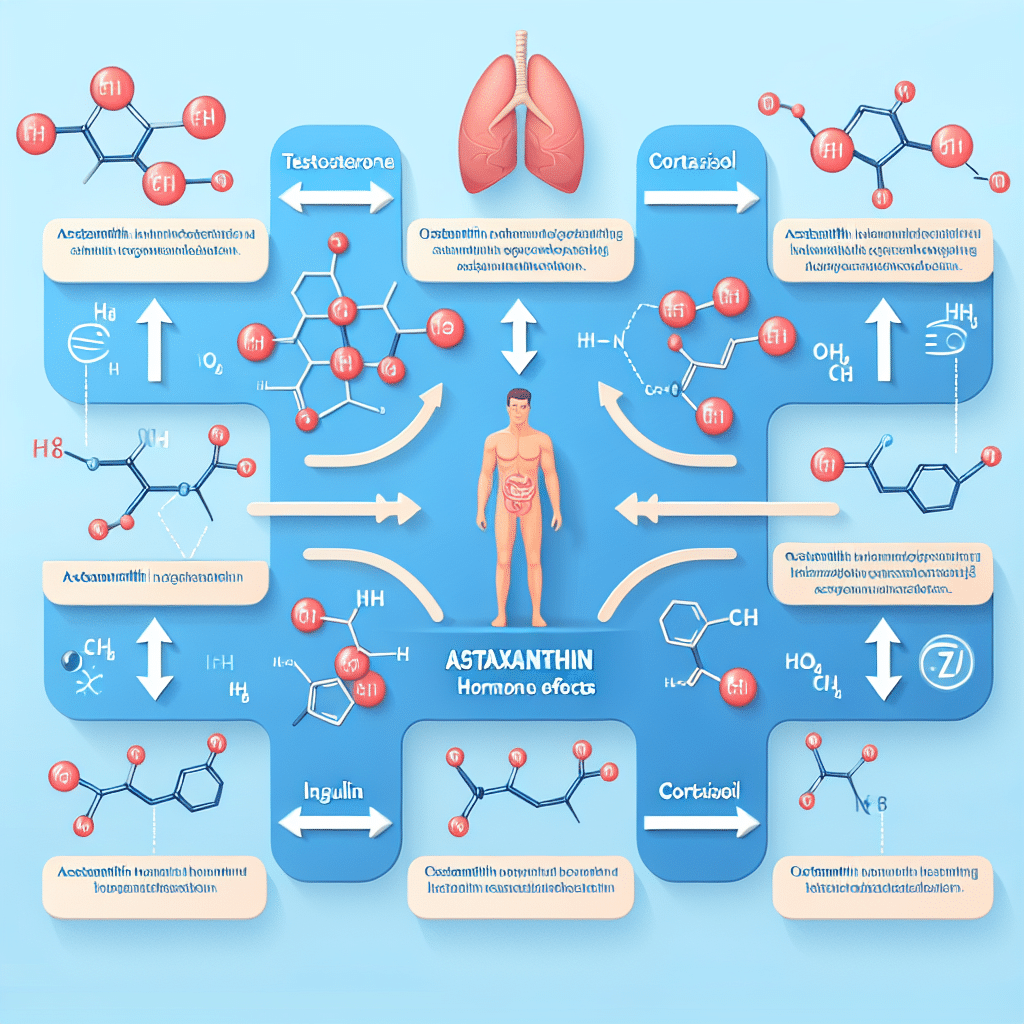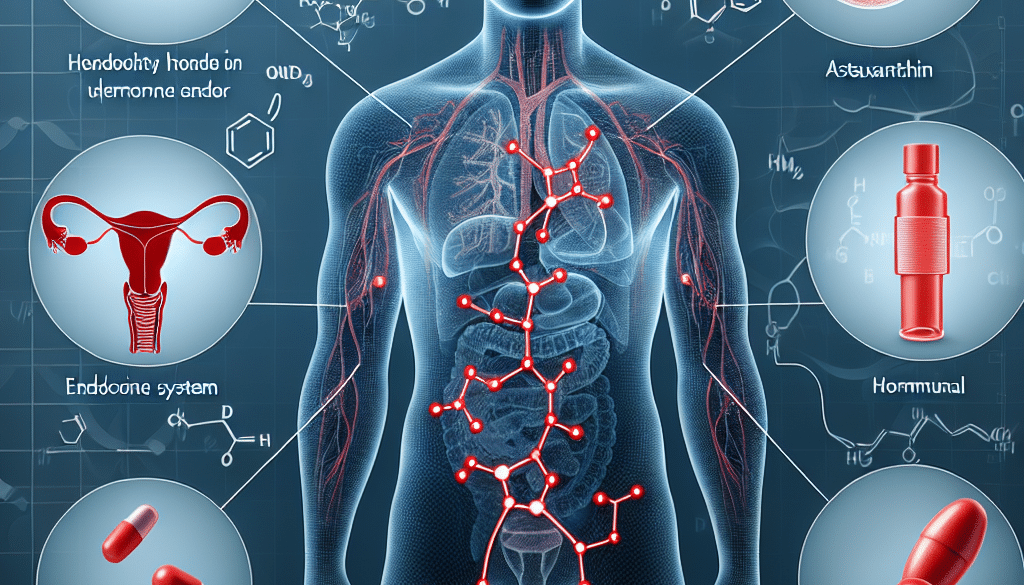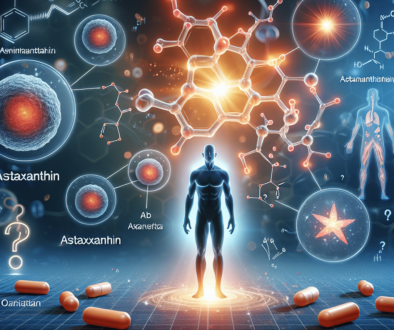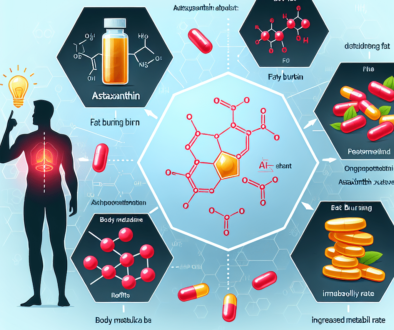What Hormonal Effects Does Astaxanthin Have?
-
Table of Contents
- Astaxanthin’s Hormonal Effects: Insights and Implications
- Understanding Astaxanthin
- The Hormonal Landscape and Astaxanthin
- Testosterone and Reproductive Health
- Estrogen and Women’s Health
- Cortisol and Stress Response
- Case Studies and Clinical Trials
- Statistical Significance and Research Findings
- Health Implications of Astaxanthin’s Hormonal Effects
- Conclusion: Key Takeaways on Astaxanthin’s Hormonal Impact
- Enhance Your Health with ETprotein’s Premium Protein Products
Astaxanthin’s Hormonal Effects: Insights and Implications

Astaxanthin, a naturally occurring carotenoid found in certain marine plants and animals, has been the subject of numerous studies due to its potent antioxidant properties. However, its influence extends beyond just combating oxidative stress. Emerging research suggests that astaxanthin may also have significant effects on the hormonal system. This article delves into the hormonal effects of astaxanthin, exploring the science behind its impact on various hormones and the potential health benefits and implications of its use.
Understanding Astaxanthin
Astaxanthin is a keto-carotenoid that contributes to the vibrant red and pink colors of salmon, shrimp, lobster, and other seafood. It is also present in the microalgae Haematococcus pluvialis, which is a primary source for commercially produced astaxanthin supplements. As a powerful antioxidant, astaxanthin is known to neutralize free radicals in the body, protecting cells from damage.
The Hormonal Landscape and Astaxanthin
Hormones are chemical messengers that play crucial roles in regulating various physiological processes, including growth, metabolism, and reproduction. Astaxanthin’s potential to influence hormonal activity has been a topic of interest, with research examining its effects on different hormones such as testosterone, estrogen, and cortisol.
Testosterone and Reproductive Health
Testosterone is a key hormone in both males and females, though it is often associated with male reproductive health. Studies have indicated that astaxanthin may have a positive impact on testosterone levels and sperm quality. For example:
- A study published in the Journal of the International Society of Sports Nutrition found that astaxanthin supplementation improved semen parameters in infertile men.
- Another study suggested that astaxanthin might increase testosterone production by enhancing luteinizing hormone (LH) stimulation of Leydig cells in the testes.
Estrogen and Women’s Health
Estrogen plays a vital role in women’s health, influencing reproductive function, bone density, and even mood. Astaxanthin’s effects on estrogen are less clear, but some research suggests it may act as a selective estrogen receptor modulator (SERM), which could have implications for conditions like osteoporosis and breast cancer.
Cortisol and Stress Response
Cortisol is known as the “stress hormone” because it is released in response to stress and low blood-glucose concentration. Astaxanthin has been studied for its potential to modulate cortisol levels, which could have benefits for stress management and overall health. For instance:
- A study on rats showed that astaxanthin could prevent stress-induced increases in adrenal weight and plasma corticosterone levels.
- In humans, astaxanthin supplementation has been associated with reduced perceived stress and improved mental clarity.
Case Studies and Clinical Trials
Several clinical trials have provided insights into the hormonal effects of astaxanthin. For example, a randomized, double-blind, placebo-controlled study on humans indicated that astaxanthin supplementation could significantly reduce oxidative stress and inflammation while improving the immune response. These effects can indirectly influence hormonal balance and endocrine function.
Statistical Significance and Research Findings
While the body of research on astaxanthin’s hormonal effects is growing, it is important to consider the statistical significance of these findings. Many studies report promising results, but larger-scale clinical trials are needed to fully understand the scope and mechanisms of astaxanthin’s impact on hormones.
Health Implications of Astaxanthin’s Hormonal Effects
The potential hormonal effects of astaxanthin could have far-reaching implications for health and disease prevention. By influencing hormone levels and activity, astaxanthin may contribute to:
- Improved fertility and reproductive health
- Enhanced athletic performance and muscle recovery
- Reduced risk of hormone-related cancers
- Better stress management and mental health
- Protection against age-related hormonal decline
Conclusion: Key Takeaways on Astaxanthin’s Hormonal Impact
In conclusion, astaxanthin appears to have a multifaceted impact on the hormonal system, with potential benefits for reproductive health, stress response, and overall well-being. While more research is needed to fully elucidate these effects, the existing evidence suggests that astaxanthin could be a valuable addition to a health-conscious lifestyle. As with any supplement, it is important to consult with a healthcare provider before starting astaxanthin, especially for individuals with specific health conditions or those taking medications.
Enhance Your Health with ETprotein’s Premium Protein Products
If you’re looking to complement the potential hormonal benefits of astaxanthin with high-quality protein sources, consider ETprotein’s range of organic bulk vegan proteins. Their products, including Organic rice protein, pea protein, and various seed proteins, are non-GMO, allergen-free, and characterized by a neutral taste. ETprotein also offers L-(+)-Ergothioneine (EGT) in various grades, suitable for nutraceutical, pharmaceutical, and cosmeceutical applications. Enhance your health and wellness regimen with ETprotein’s reliable and premium protein solutions.
About ETprotein:
ETprotein, a reputable protein and L-(+)-Ergothioneine (EGT) Chinese factory manufacturer and supplier, is renowned for producing, stocking, exporting, and delivering the highest quality organic bulk vegan proteins and L-(+)-Ergothioneine. They include Organic rice protein, clear rice protein, pea protein, clear pea protein, watermelon seed protein, pumpkin seed protein, sunflower seed protein, mung bean protein, peanut protein, and L-(+)-Ergothioneine EGT Pharmaceutical grade, L-(+)-Ergothioneine EGT food grade, L-(+)-Ergothioneine EGT cosmetic grade, L-(+)-Ergothioneine EGT reference grade and L-(+)-Ergothioneine EGT standard. Their offerings, characterized by a neutral taste, non-GMO, allergen-free attributes, with L-(+)-Ergothioneine purity over 98%, 99%, cater to a diverse range of industries. They serve nutraceutical, pharmaceutical, cosmeceutical, veterinary, as well as food and beverage finished product distributors, traders, and manufacturers across Europe, USA, Canada, Australia, Thailand, Japan, Korea, Brazil, and Chile, among others.
ETprotein specialization includes exporting and delivering tailor-made protein powder and finished nutritional supplements. Their extensive product range covers sectors like Food and Beverage, Sports Nutrition, Weight Management, Dietary Supplements, Health and Wellness Products, and Infant Formula, ensuring comprehensive solutions to meet all your protein needs.
As a trusted company by leading global food and beverage brands and Fortune 500 companies, ETprotein reinforces China’s reputation in the global arena. For more information or to sample their products, please contact them and email sales(at)ETprotein.com today.













